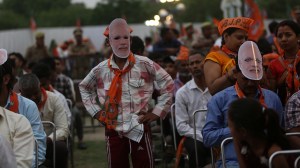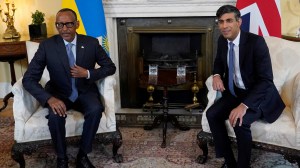- India
- International
View from the right: Many festoons
“Every party has a symbolic manifesto but while campaigning, ‘vote bank politics’ and ‘say NO to Modi’ is the underlying current.”
MANY FESTOONS
Skirting the issue of the BJP’s delayed release of its election manifesto, the Organiser provides a comparative assessment of the promises made by the BJP, Congress and AAP in its cover story to suggest the BJP’s promises are better. More than that, the cover story seeks to underline an alleged “underlying” theme in the form of the “Stop Narendra Modi” rhetoric: “Every party has a symbolic manifesto but while campaigning, ‘vote bank politics’ and ‘say NO to Modi’ is the underlying current,” declares the cover, flagging the election symbols of so-called secular parties from UP, Bihar, West Bengal, Maharashtra and the Left. Yet, the front-page caricature doesn’t brand the Jayalalithaa-led AIADMK and Naveen Patnaik’s BJD with those parties.
The story does acknowledge the challenges and apprehensions about their big promises and the emphasis on federalism that may run counter to the strong central leadership theme: “The BJP has dealt with a plethora of issues in its manifesto and has virtually promised the moon. But, the million dollar question is whether five years would be sufficient to fulfil these promises… the over emphasis on the federal characteristics would contribute to dilution of the idea of a strong Centre, so critical to preserving and sustaining the nation’s unity and integrity”.
SAFFRON WAVE
The Panchjanya cover story fans the impression of a “Modi wave”, suggesting it is a “saffron wave” where things appear to be going in the BJP’s favour: “The countrywide support stemming from the unprecedented surge of the saffron wave has brought the BJP to such a point that its every move appears correct and everything is turning out to be in its favour,” declares the cover story, with an image of Narendra Modi’s mask against a saffron background.
The “BJP’s massive electoral successes in the recent assembly elections on the one hand and the mounting evidence from the opinion poll surveys on the other clearly indicate a tilt towards the National Democratic Alliance, whether in rural or urban areas and among men or women,” the editorial emphasises, underlining that only “a gang of UPA and a few analysts on TV debates are disputing the wave…”
MODI DIVIDE

The Organiser has unwittingly exposed the polarising impact of Narendra Modi among the intelligentsia and in the media. While the editorial reacts strongly to The Economist’s criticism of Modi, other articles reveal deep disagreements within the intelligentsia over Modi. The editorial, in fact, cautions the international media, and The Economist in particular, for its alleged “stop Narendra Modi” agenda. The “Congress is a silent facilitator, for being hand in glove with the big and small parties in India for thriving on vote-bank politics by creating divisions on the basis of caste, region or religion. It is unfortunate, that despite all this, the dual message of the Congress does not disturb the international media as much as Modi…”
A full-page report takes a critical view of a group of intellectuals for coming out against Modi and describes them as “secular opportunists” acting as “new allies of Congress” in Karnataka. The article has singled out U.R. Ananthamurthy and Girish Karnad and alleges that they have benefited from the Congress, despite the fact that “Karnataka has produced several other writers and academics, who were definitely notches above the Ananthamurthy-Karnad duo in erudition and literary output… It is no surprise that Ananthamurthy and Karnad are campaigning for the Congress openly…” The accompanying story highlights that a “group of nationalist academics” have appealed to the electorate to welcome the “new Dawn of India in the form of Narendra Modi-led Government” and “rejoice at the emergence of a leadership” committed to bringing back Indian glory.
The list of nationalist academicians mentioned includes Madhu Purnima Kishwar, highlighting how she was denied permission to launch her book on Modi by the Gandhi Peace Foundation, India International Centre, India Habitat Centre and Indian Women Press Corps. The article calls this as an “intellectual emergency by secular brigade” before Modi comes to power, riding his own wave.
Compiled by Ravish Tiwari
EXPRESS OPINION
Apr 25: Latest News
- 01
- 02
- 03
- 04
- 05










































